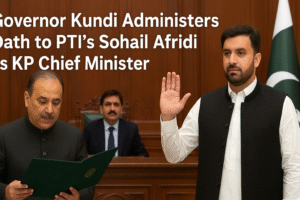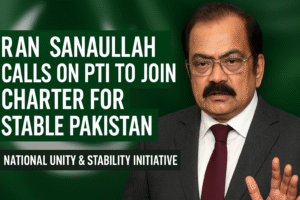Governor Kundi Administers Oath to PTI’s Sohail Afridi as KP Chief Minister
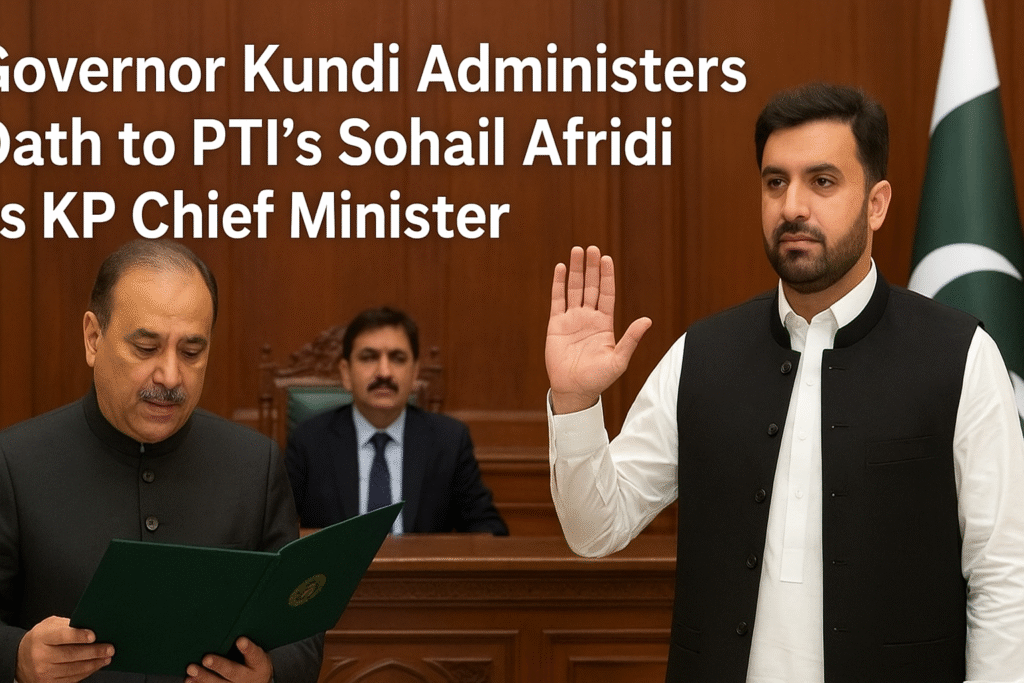
Introduction: A Political Turning Point in Khyber Pakhtunkhwa
In a landmark political development, Governor Faisal Karim Kundi administered the oath of office to Pakistan Tehreek-e-Insaf’s (PTI) Sohail Afridi as the new Chief Minister of Khyber Pakhtunkhwa (KP) on Wednesday at the Governor House, Peshawar. The ceremony marks a significant moment in provincial politics following weeks of intense lobbying, internal rifts, and high-stakes negotiations within PTI’s ranks. Sohail Afridi KP CM, Governor Kundi oath ceremony, PTI Khyber Pakhtunkhwa government, KP Chief Minister 2025, Pakistan Tehreek-e-Insaf politics, KP Assembly update, Pakistan political news.
The swearing-in signals the consolidation of PTI’s control in KP — a province that has long been its political stronghold since 2013. With Afridi now at the helm, the party aims to restore governance stability, focus on development priorities, and rebuild its image after months of political uncertainty across Pakistan.
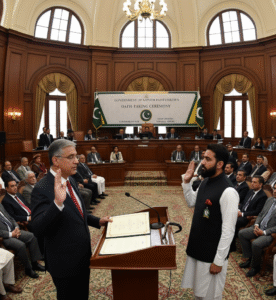
Who is Sohail Afridi? A Profile of KP’s New Chief Minister
Sohail Afridi, a seasoned politician and long-time PTI loyalist, hails from Khyber District, one of the most strategically important areas of the merged tribal districts. Known for his grassroots politics, Afridi rose through PTI’s organizational structure, serving as district president before winning his provincial assembly seat from PK-75 Khyber-II.
Afridi is considered a close ally of PTI founder Imran Khan and is viewed as a pragmatic leader capable of bridging divides between party factions and the provincial bureaucracy. His political career is marked by efforts to improve education, healthcare, and border trade in tribal regions, earning him respect among local constituents.
His elevation to the chief ministership reflects PTI’s commitment to empowering leadership from the merged tribal areas (Ex-FATA) — a move seen as both symbolic and strategic.
Governor Faisal Karim Kundi’s Role: A Smooth Transition Amid Tension
Governor Faisal Karim Kundi, a senior Pakistan Peoples Party (PPP) figure, conducted the ceremony in accordance with constitutional formalities. Political analysts have praised the governor for ensuring a peaceful and dignified transition of power, particularly at a time when federal-provincial relations are delicate.
Despite political differences, Governor Kundi maintained neutrality during the process, emphasizing in his brief address that “democratic institutions must function within constitutional limits.” His remarks were seen as a subtle nod to the ongoing tensions between the federal coalition government and PTI-led provinces.
The Ceremony: Highlights from the Oath-Taking Event
The oath-taking ceremony was held at the Governor House in Peshawar, attended by senior officials, PTI lawmakers, and members of the provincial cabinet. The event began with the recitation of the Holy Quran, followed by the formal swearing-in conducted by Governor Kundi.
Key PTI figures, including Asad Qaiser, Ali Amin Gandapur, and Barrister Muhammad Ali Saif, were present, signaling party unity after internal divisions over leadership choices.
The ceremony was broadcast live on national television and streamed by major media outlets, symbolizing transparency and public engagement.
Political Context: PTI’s Reassertion in KP
PTI’s return to full administrative power in Khyber Pakhtunkhwa through Sohail Afridi’s leadership comes after months of uncertainty. The province faced governance stagnation following the dissolution of the KP Assembly earlier this year and the subsequent delays in reconstituting provincial leadership.
This appointment not only consolidates PTI’s influence but also demonstrates its resilience amid political challenges at the federal level, where the party faces legal and administrative hurdles.
Political observers believe Afridi’s appointment is a strategic move by PTI to rebuild its governance model in KP — a province often regarded as the “heartbeat of PTI’s popularity.”
Imran Khan’s Message from Prison
In a statement issued through PTI’s media cell, party founder Imran Khan, currently incarcerated, congratulated Sohail Afridi and urged him to uphold meritocracy and good governance. “Khyber Pakhtunkhwa has always been the foundation of PTI’s reform agenda,” the message read. “Our new chief minister must continue that mission by prioritizing education, healthcare, and transparency.”
This public endorsement has strengthened Afridi’s legitimacy within PTI ranks and energized supporters across the province.
Cabinet Formation: Expected Faces and Portfolios
According to insider reports, Chief Minister Afridi is set to announce his cabinet within the next 48 hours. Prominent names being considered include:
-
Shaukat Yousafzai – Information and Broadcasting
-
Taimur Jhagra – Finance and Planning
-
Ziaullah Bangash – Education
-
Muhammad Atif Khan – Energy and Power
-
Dr. Hisham Inamullah – Health
Sources close to the CM’s office reveal that Afridi aims to bring technocratic expertise and administrative balance into his cabinet, avoiding internal favoritism that previously plagued PTI’s provincial team.
Challenges Ahead for Sohail Afridi
While the oath-taking marks a new beginning, the challenges before Chief Minister Afridi are enormous:
-
Restoring Governance: KP’s bureaucracy has been paralyzed amid political infighting. Afridi must reestablish administrative order.
-
Economic Recovery: The province faces fiscal constraints due to reduced federal transfers and developmental budget cuts.
-
Security Concerns: Recent terror attacks in Dera Ismail Khan, Swat, and Khyber District underscore the need for a comprehensive security strategy.
-
Rehabilitation of Merged Districts: Socioeconomic integration of ex-FATA remains incomplete; Afridi’s roots in Khyber may help accelerate reforms.
-
Public Services: Healthcare and education remain underfunded sectors requiring immediate policy interventions.
Opposition’s Reaction: Skepticism and Caution
Opposition leaders in the KP Assembly have expressed cautious optimism. The Jamiat Ulema-e-Islam (F) termed the oath-taking a “routine democratic process,” while the Awami National Party (ANP) stressed the need for “inclusive governance.”
PPP provincial president Najmuddin Khan congratulated Afridi but warned that “mere symbolism will not resolve people’s issues — governance performance will.”
Meanwhile, PML-N leaders voiced concerns about PTI’s previous governance record, urging Afridi to avoid “politicizing provincial institutions.”
Federal Government’s Position
At the federal level, the Prime Minister’s Office issued a neutral statement acknowledging the oath-taking and reaffirming the federal government’s “commitment to supporting all provinces without discrimination.”
Analysts interpret this as a signal to avoid friction with PTI-led KP amid heightened political polarization nationwide.
Public Reaction: Hope and Expectations
Public sentiment across KP has been largely positive. On-ground surveys conducted by local news agencies in Peshawar, Swat, and Bannu show that residents expect Afridi to address inflation, job creation, and law and order.
Social analysts suggest that PTI’s performance in KP under Afridi will heavily influence the party’s future electoral prospects, especially if general elections are held within the next year.
Historical Perspective: PTI’s Decade in KP
PTI’s governance journey in KP began in 2013, when it first came to power with a reform-oriented manifesto. From police reforms to local government empowerment, the party reshaped governance norms — though not without controversy.
Under former CMs Pervez Khattak and Mahmood Khan, PTI laid the foundation for projects like BRT Peshawar, Sehat Card Plus, and Education Reforms, initiatives that earned mixed reviews for implementation but were recognized nationally for innovation.
Afridi inherits both the successes and shortcomings of that legacy — a crucial test for his political acumen.
Regional Implications: Tribal Areas and Beyond
As a representative from Khyber, Afridi’s leadership may improve coordination between the provincial and tribal administrations. Experts believe his tribal identity could help in confidence-building measures with local elders and resolving land disputes that hinder development projects in the merged districts. Sohail Afridi KP CM, Governor Kundi oath ceremony, PTI Khyber Pakhtunkhwa government, KP Chief Minister 2025, Pakistan Tehreek-e-Insaf politics, KP Assembly update, Pakistan political news.
Furthermore, his experience with cross-border trade policies may facilitate economic revival in border regions, boosting small-scale industries and employment.
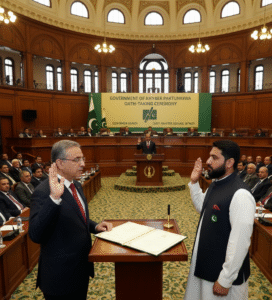
Media and Public Discourse
National media outlets have described Afridi’s appointment as a “new chapter” in PTI’s political narrative. Editorials emphasize that his success will depend on policy continuity, transparency, and coalition management.
Political commentators highlight that Afridi must balance PTI’s populist expectations with the realities of governance, especially under tight fiscal constraints and external political scrutiny. Sohail Afridi KP CM, Governor Kundi oath ceremony, PTI Khyber Pakhtunkhwa government, KP Chief Minister 2025, Pakistan Tehreek-e-Insaf politics, KP Assembly update, Pakistan political news
International Observation
Foreign missions in Islamabad, particularly from the European Union, United States, and China, have welcomed the peaceful transition, citing it as a positive sign for Pakistan’s democratic maturity. KP’s stability is crucial for regional trade and counter-terrorism coordination, especially under the Pakistan-Afghanistan security framework.
Conclusion: A Test of Leadership and Governance
Governor Kundi’s administration of the oath to PTI’s Sohail Afridi as KP Chief Minister represents more than a ceremonial act — it’s a turning point for PTI’s governance narrative. Afridi’s leadership will be judged not only on political loyalty but on his ability to deliver tangible results to the people of Khyber Pakhtunkhwa. Sohail Afridi KP CM, Governor Kundi oath ceremony, PTI Khyber Pakhtunkhwa government, KP Chief Minister 2025, Pakistan Tehreek-e-Insaf politics, KP Assembly update, Pakistan political news
As Pakistan navigates economic uncertainty and security challenges, KP’s stability under Afridi could become a model of resilience and governance reform — or a reminder of the perils of political stagnation.



